Eastern cultures have been utilizing mushrooms for centuries in both folk and traditional medicine. While the United States (the western world in general, really) has been a little slower on the mushroom for healing purposes uptake, Americans are seeing the light because of the amazing nutritional value and potential health benefits of fungi.
If you're here, you're likely wondering how mushrooms can contribute to your overall gut health.
You've come to the right place!
In this article, you'll learn why mushrooms are great for your gut, as well as some of the best mushrooms and supplements to incorporate into your diet.
Let's dive in:
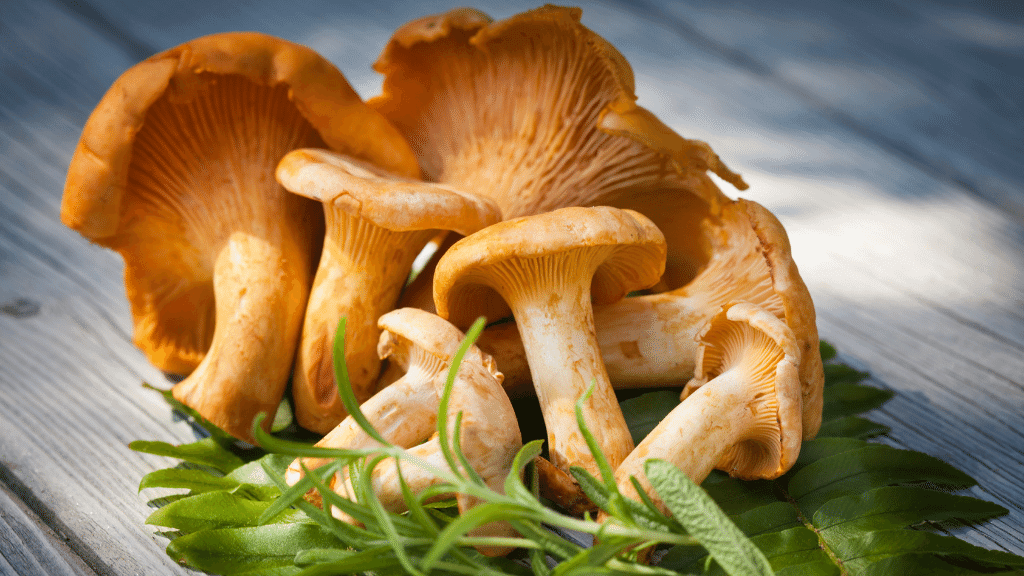
What makes mushrooms so good for your gut?
Mushrooms are great for your gut health in two key ways. First, they're high in fiber and other compounds and minerals. But there is also emerging research in using medicinal mushrooms to help with microbiome balance.
Some of the benefits of incorporating gourmet and medicinal mushrooms into your diet include:
- High quality proteins: Fungi in general are a great source of high-quality proteins - this is especially great news for vegans and vegetarians who rely on other foods to get their daily protein intake. Oyster mushrooms are a great example as they are made up of 30% protein. Many consider mushrooms to be at the forefront of helping to address climate change as mushrooms have such a high protein content and maybe the answer to our reliance on meat.
- Vitamins: B-complex vitamins are significant in the fruiting bodies of mushrooms, specifically b12. With b12 being a crucial vitamin for our body to continue creating new and healthy blood cells, mushrooms make for a great dietary addition to ensure we’re getting enough of this vitamin. Additionally, mushrooms are filled with vegan vitamin D. Win, win in the vitamin department.
- Minerals: Mushrooms are a rich source of minerals. In fact, some types have as much at 7-12% of their total makeup being minerals alone. In particular, mushrooms are a good source of trace minerals like zinc, copper, and iron, as well as macrominerals like phosphorus and potassium.
- Beta-glucans: We only mention beta-glucans because they’re one of the key compounds found in mushrooms that make them extremely beneficial for medicinal purposes. The little fibers found in the cell walls of mushrooms are shown to help boost the immune system and even fight off harmful diseases like cancer. Learn more about beta-glucans on our blog.
In addition to these nutrients, mushrooms are also great sources of:
- Selenium
- Copper
- Thiamin
- Magnesium
- Phosphorous
- Potassium
But, you came here for the gut health information, so most importantly, mushrooms are high in: FIBER!
And this is good news, because America has a big fiber problem which is leading to significant gut issues. Mushrooms to the rescue!
Let’s look at this issue in more depth.
The best mushrooms for gut health
Out of the hundreds of species of mushrooms, a few shine above all when it comes to gut health benefits: reishi, lion’s mane, turkey tail, shiitake, and chaga. Here’s why:
1. Reishi mushrooms
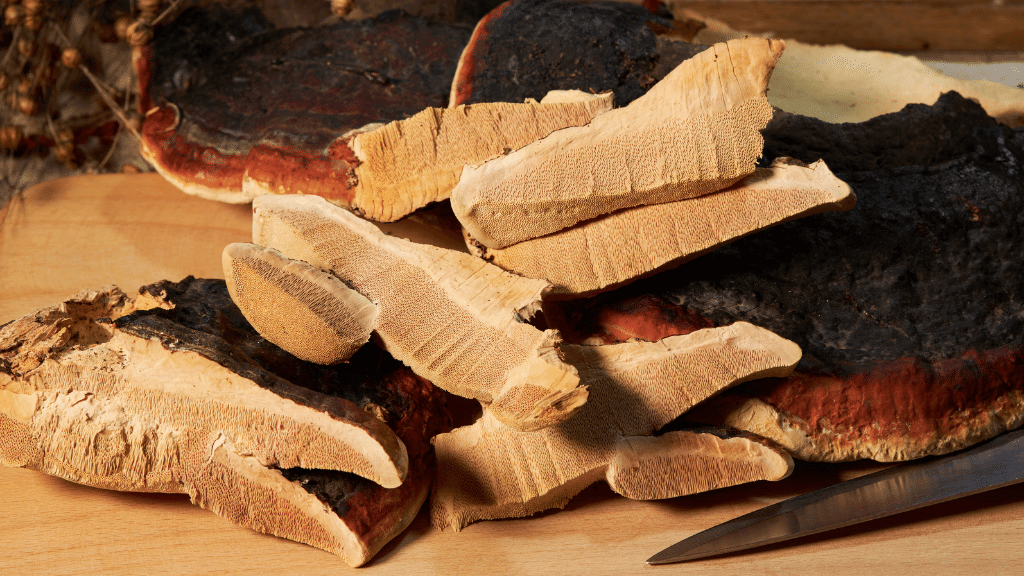
Reishi mushrooms may contain up to 85% fiber and have been shown to have a positive effect on the composition and ratio of bacteria in the gut. They also help in balancing cell makeup that comes from poor diet, stress, and more. Plus, the high presence of beta-glucans and polysaccharides found in reishi mushrooms give it the ability to activate immune function, and induce the production of antioxidants and anti-inflammatory and immune response in the body. This is key for overall health and wellbeing.
Let’s look at a few of the studies that back up reishi’s role in better gut health:
- MICE STUDY: As an example, eating more reishi mushrooms has been shown to reduce obesity in mice due to improvement in healthy gut bacteria.
- IN-VITRO STUDY: It was shown that polysaccharides from edible mushrooms suppress mRNA expression in 3T3-L1 adipocytes, contributing to their anti-obesity properties
- STUDY REVIEW: In a review of reishi studies, it’s been shown that reishi was shown to protect cell integrity and reduce the chance of someone getting leaky gut syndrome.
Since many consider reishi to be top dog when it comes to fiber, we’re here to confirm it: reishi fiber for the win.
Head on over to the reishi learning center to learn more about this powerful functional mushroom.
2. Lion’s mane mushrooms
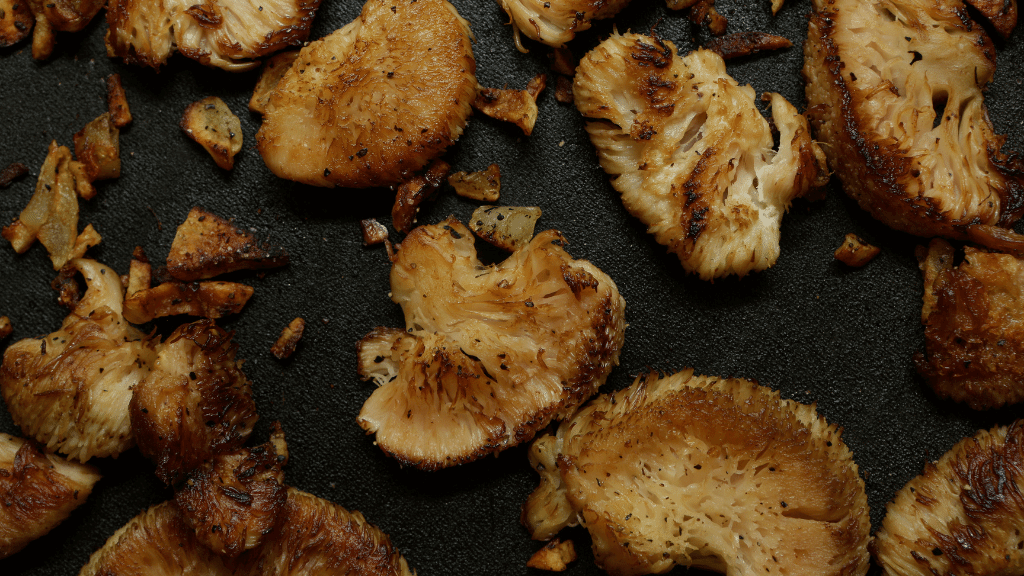
Lion's mane mushroom is jam-packed with healthy nutrients, fiber, and bioactive and adaptogenic compounds. In particular, lion’s mane has been shown to help treat or prevent ulcers that develop in the gut and/or digestive tract. Since ulcers are caused by bad gut bacteria overgrowth and damage to your natural mucus layer, lion’s mane can help play a key role in maintaining a balanced gut bacteria level.
Let’s look at a few studies:
- IN-VITRO STUDY: Several studies, this one included, show that lion’s mane can inhibit the growth of H. pylori, reducing the chance of a body developing an ulcer.
- HUMAN STUDY: For patients with crohn's disease, lion’s mane supplements were shown to improve quality of life by reducing symptoms and inflammation in the gut over a one month period.
- MICE STUDY: Lion’s mane supplementation was shown to reduce oxidative stress on the colon over time.
If you suffer from Crohn’s or have developed ulcers in the past, lion’s mane could be a good supplement to introduce to overhaul your gut health in a sustainable way.
We have an entire free learning center dedicated to lion's mane. Check it out!
3. Turkey tail mushrooms
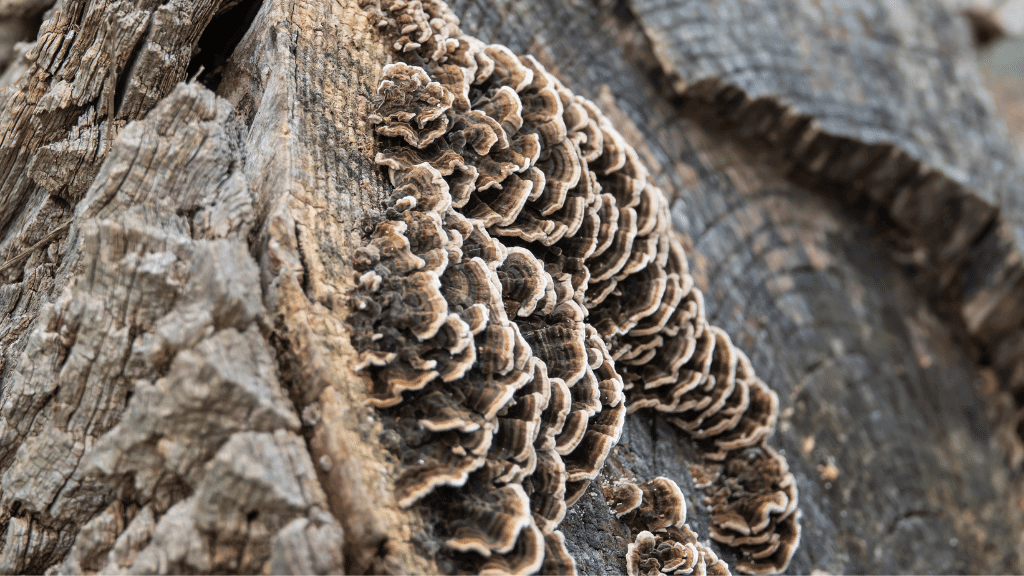
Turkey tail mushrooms are one of the most highly studied mushrooms out there - which means there is some great (human tested) information on fiber content of this mushroom and why it’s considered good for your gut. Studies have shown that fructooligosaccharides and polysaccharide peptides found in turkey tail may help increase good gut bacteria, and thus inoculate our gut and support our immune system from as early as birth:
- HUMAN STUDY: After looking at human feces (yup, we’re in poop talk zone, bear with us), it was shown that turkey tail supplementation helped to decrease bad gut bacteria over time.
- HUMAN STUDY: In a randomized clinical trial, it was found that, similar to reishi, turkey tail may act as a prebiotic for the body to help regulate and protect good gut bacteria.
It’s particularly recommended to take turkey tail if you’ve recently undergone a treatment of antibiotics since those are proven to mess up gut flora. Give it a try (but talk to your doctor first, please)!
Turkey tail mushrooms aren't just great for your gut. Find out more in our turkey tail learning center.
4. Shiitake
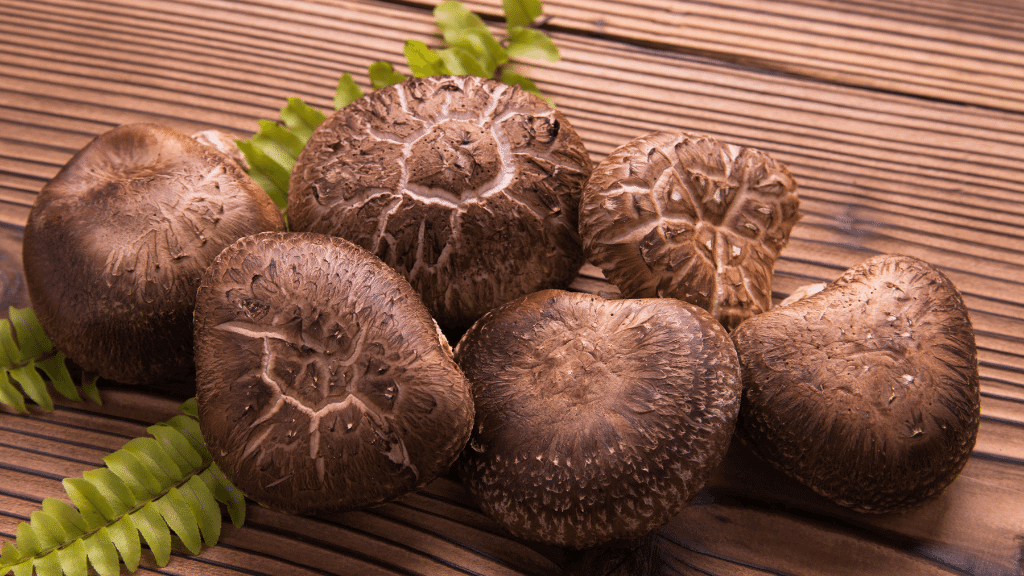
Shiitake mushrooms, when dried, contain 2g of fiber per fruiting body. This high-in-fiber mushroom is most often known as a kitchen delicacy, but in recent years, has gained traction in the health world for its numerous bioactive compounds when extracted appropriately. In particular, eating shiitake mushrooms or taking shiitake supplements may help with gut health:
- IN-VITRO STUDY: This Bangladeshian study leads us to believe that shiitake has antimicrobial properties - but more information is needed.
- MICE STUDY: This study showed that mice experienced depressed external (bad) pathogens found in the GI tract when taking shitake supplements.
- HUMAN STUDY: In a randomized dietary intervention conducted on young adults, it was shown that shiitake increased the presence of natural killer (NK) cells in the gut to protect the GI tract.
For an easy way to incorporate shiitake mushrooms into your diet, check out our blog.
5. Chaga
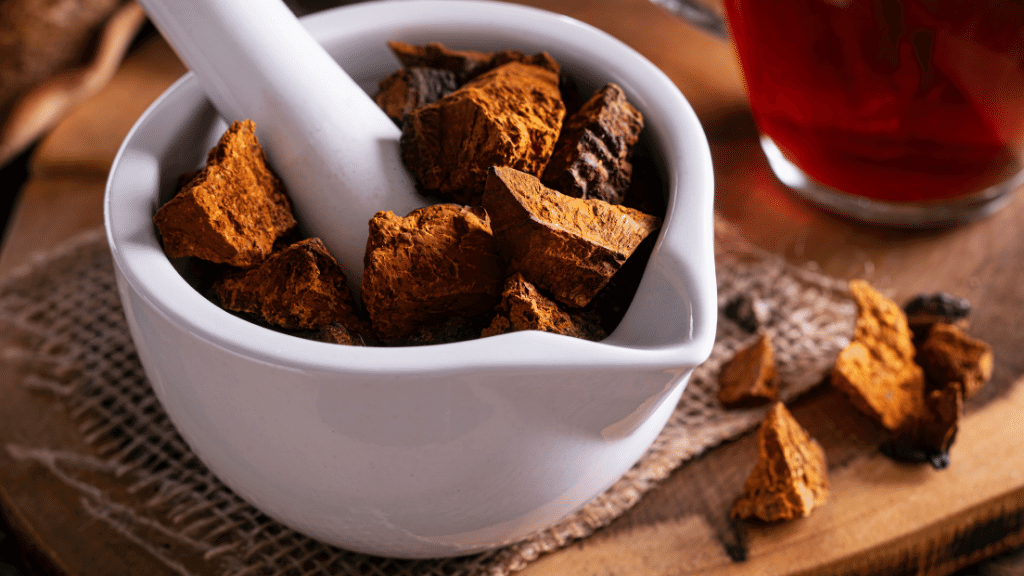
Ahh chaga, the potent antioxidant super mushroom. Due to its high antioxidant makeup, chaga has been shown to boost the immune system naturally and attack free radicals or harmful molecules found in the gut. In particular, it seems to help with digestive assistance. Let’s look at why:
- IN-VITRO STUDY: When looking at patients with irritable bowel syndrome (IBD), chaga was shown to reduce oxidative stress in lymphocytes from IBD patients and also healthy individuals when challenged in-vitro.
- MICE STUDY: Chaga has also been shown to help fight bad bacteria commonly found with Crohn’s disease and ulcerative colitis.
Crohn’s patients - or anyone who struggles with regulating their digestive system - chaga might be the mushroom for you.
For more on chaga's overall health benefits, check out our blog.
So, with all of this information in mind, is more being done to utilize the fiber content of mushrooms?
In short, yes. Here’s what’s next on the mushroom fiber supplement front.
America’s fiber problem
Plain and simple, Americans don’t get enough fiber in their diets. In fact, just 7% of Americans (on average) are getting the necessary amount of fiber in their daily meals, which is further causing chronic diseases - this is equivalent to 1 in 10 US adults. In most industrialized countries, people get around 15g of fiber daily. However, in non-industrialized countries where processed foods are not consumed as heavily, this statistic is closer to 50 or 60g of fiber daily. We could learn a thing or two from non-industrialized (third world) countries, huh?
So, how could mushrooms help with this?
We’re so glad you asked.
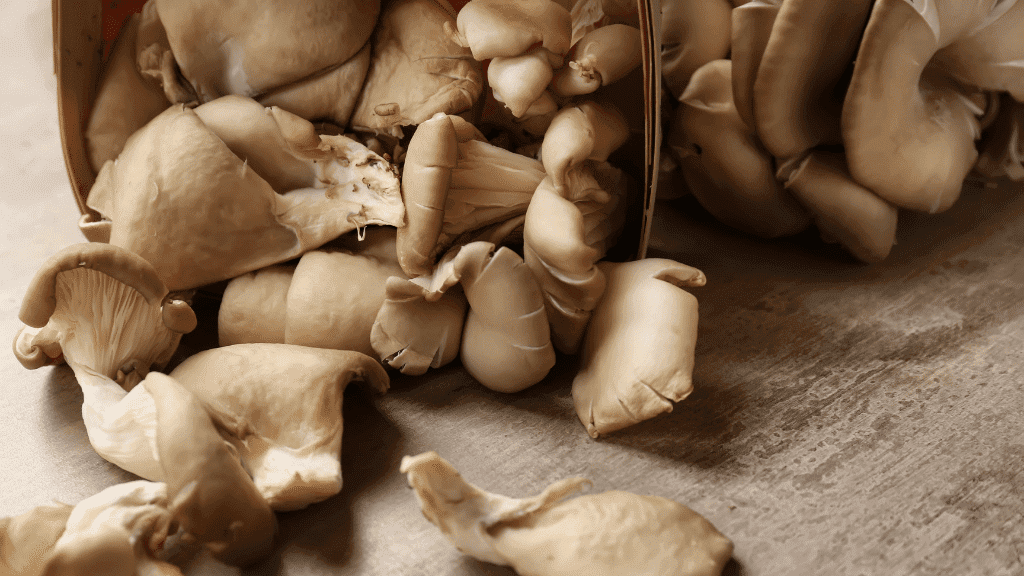
Understanding the use of mushrooms as dietary fiber
Mushrooms are considered one of the highest fiber foods around. If you’re looking at dry weight alone, mushrooms actually have the highest dietary fiber of any food. The fiber found in mushrooms resides in the cell walls of the mushroom - two types of fibers found are beta-glucans and chitin, which are shown to help with better immune response in the body.
This makes mushrooms great for digestion and overall gut health. Given the number of Americans that struggle with fiber intake and, as a result, their digestion and overall gut health, this could be a big win for us all.
To understand the value of mushrooms as a dietary fiber, let’s first take a closer look at what dietary fiber is.
What is dietary fiber?
Dietary fiber (a.k.a. roughage or bulk) includes plant food parts that your body isn’t able to digest or absorb as it does with fats, carbs, and proteins. On the contrary, dietary fiber passes, mostly intact, through the stomach, intestines, colon, and out of the body while providing beneficial support along the way. These benefits include helping with regular bowel movements, improving overall cardiovascular health, lowering cholesterol, improving blood pressure, decreasing inflammation, helping prevent diabetes or improving blood sugars, and just plain ol’ increasing life expectancy.
Ten points for fiber (if you don’t get that Harry Potter reference…we’re sorry)!
This leads us to the two types of dietary fibers…soluble and insoluble fiber.
The difference between soluble and insoluble fiber
Fiber is commonly classified as soluble, which dissolves in water, or insoluble, which doesn't dissolve at all.
- Soluble fiber dissolves in water to form a gel-like material. It can help lower blood cholesterol and glucose levels. Soluble fiber is found in chia seeds, oats, peas, beans, apples, citrus fruits, carrots, barley, psyllium, and, you guessed it, mushrooms.
- Insoluble fiber doesn’t dissolve at all. This type of fiber promotes the movement of material through your digestive system. It can be found in whole-wheat products, wheat bran, nuts, beans, and vegetables, to name a few.
Now that we’ve covered all things fiber, let’s look at the dietary fiber content of some of our favorite mushroom species and how this compares to other high-fiber foods.
How much fiber do mushrooms have?
The cell walls of the mushrooms are typically where the highest percentage of dietary fiber lives. Fiber is not singularly found in just one mushroom type, so the good news is that you have lots of options if you’re trying to up your fiber intake game with mushrooms.
Let’s take a look at the makeup of various mushroom species:
Proximate composition of some common mushroom species1
Mushrooms with the highest fiber chart
|
Mushroom species |
Crude protein2 |
Crude fat3 |
Carbohydrate |
Crude fiber4 |
Ash |
|
Button |
23.9-34.8 |
1.7-8 |
51.3-62.5 |
8-10.4 |
7.7-12 |
|
Black fungus |
8.1 |
1.5 |
81 |
6.9 |
9.4 |
|
Cep |
29.7 |
3.1 |
51.7 |
8 |
5.3 |
|
Chanterelle |
21.5 |
5 |
64.9 |
11.2 |
8.6 |
|
Maitake |
21.1 |
3.1 |
58.8 |
10.1 |
7 |
|
Monkeyhead |
22.3 |
3.5 |
57 |
7.8 |
9.4 |
|
Shiitake |
13.4-17.5 |
4.9-8 |
67.5-78 |
7.3-8 |
3.7-7 |
|
Oyster |
10.5-30.4 |
1.6-2.2 |
57.6-81.8 |
7.5-8.7 |
6.1-9.8 |
|
White Jelly Fungus |
4.6 |
0.2 |
94.8 |
1.4 |
0.4 |
|
Matsutake |
16.1 |
4.3 |
70.1 |
4.5 |
5 |
|
Black truffle |
23.3 |
2.2 |
66.2 |
27.9 |
8.3 |
|
Straw |
30.1 |
6.4 |
50.9 |
11.9 |
12.6 |
- All data presented as a percentage of dry weight.
- The nitrogen factor used for crude protein calculation was 4.38.
- The carbohydrate content was calculated by subtracting the difference.
- The crude fiber contains mainly the water-insoluble fiber fraction.
In addition to the high fiber content of many mushrooms, they’re also low in calories which make them a healthy and easy addition to a lot of different types of meals without sacrificing glycemic index needs.
For the purposes of this article, we’ll be focusing on five mushroom species that are rich in fiber including lion’s mane, turkey tail, shiitake, and chaga.
But first, let’s look at how mushrooms stack up to other high-fiber foods.
How do mushrooms compare to other high-fiber foods?
As mentioned before, mushrooms are the fiber king when it comes to comparing dry weight fiber against various foods. You saw the various species and their fiber makeup in the graph above, so, how does that stack up against some of the other well known high fiber foods?
|
High fiber food |
Crude fiber (in grams) |
|
3 medium or 2 large shiitake mushrooms |
7g |
|
1 cup of cooked lentils |
16g |
|
1 cup of raw muesli, soaked |
8g |
|
1 cup of raw carrots |
3g |
|
1 regular sized apple |
4g |
Mic drop. It’s safe to say mushrooms hold their own in the fiber world.
Are mushrooms a good prebiotic?
Mushrooms act as a prebiotic to stimulate the growth of healthy gut microbiota (a.k.a. microbiome). Acting as a prebiotic, mushrooms depress endogenous pathogens found within the gastrointestinal (GI) tract to improve the immune response and fight bad cells within the gut.
Which leads us to…
What is the gut microbiome?
Trillions of microbes exist in your gut - and most are found in a pocket of the intestine called the cecum. The bacteria found in this section are “gut microbiome”. What’s crazy is that these microbes weigh from 2-5 pounds (that’s roughly the same weight as your brain) and therefore play a very important role in overall health.
Scientists are still in full on discovery mode when it comes to the gut and how important these various bacteria presence are for overall health and wellbeing. So far they’ve found that gut health is linked to better mood, immunity, and longevity (a.k.a. the gut is kind of a big deal).
The future of mushrooms as a fiber supplement
In recent years, it’s been found that sclerotium - a compact mass of hardened mushroom mycelium - has an extremely dense fiber makeup. Supplements are being created using this dense mushroom format and it’s likely to be sold in the future.
In the meantime, you can purchase various supplements for all of the mushrooms listed above. Just ensure you do your research to ensure the mushroom company has:
- A Certificate of Authentication (CoA) to show the process by which they extract the supplements
- Details on the specific extract process for the product you’re interested in
It's also important to remember that simply cooking with mushrooms you find in your local grocery store or farmer's market is a great way to add more mushrooms to your diet. Read more ways to incorporate mushrooms into your routine.
Or, check out these brands we recommend for the best mushroom supplements.
The long and short of it is that adding mush more mushrooms to your diet helps your gut and may help you live longer - and we’re willing to take those chances (we’re just going to do some research on which supplement is best for us. We suggest you do the same)!
The best mushroom supplements for gut health
Here at Remeday, we've done extensive research on some of the top mushroom brands. When it comes to your gut health, you don't want to waste time, money, or gut energy on the wrong mushroom product. Unfortunately, there are a lot of shady companies out there trying to sell you low-quality or un-tested products.
There are a number of things you should look for when buying a mushroom product for gut health.
-
Mushroom quality: Ahh, yes. The timeless mycelium vs fruiting body debate! When it comes to your gut health, you don't want to sacrifice quality for cost. That means you need to look for supplements that use 100% fruiting bodies of mushrooms. Some products include the mushroom mycelium (the 'root-like' structure of the mushroom) and don't openly disclose their ratios or extraction methods. With that being the case, try to avoid products that use mycelium grown on grains, as they can have lower levels of bioactive compounds.
-
Dual extraction process: Opt for supplements that use dual extraction (both water and alcohol extraction), as this method ensures a higher concentration of both water-soluble and alcohol-soluble compounds, such as polysaccharides and triterpenes.
-
Purity and potency: Only buy supplements that have been third-party lab tested for purity, safety, and potency. Sometimes this is listed as a "COA" which stands for Certificate of Analysis. A COA can help to ensure your product is free of contaminants like heavy metals, pesticides, and other harmful substances.
-
Brand reputation: We really can't stress this one enough. Some of the best 'marketed' brands are selling the worst products! Not every pretty website is committed to creating the best medicine. Research the manufacturer's reputation. Look at reviews and testimonials. Ask where they source their mushrooms from. Ask to see third-party testing. Look for reviews that aren't just 5-stars!
-
Certifications: It's a good idea to look for products that are certified organic, non-GMO, and made in facilities that follow Good Manufacturing Practices (GMPs). But remember! Certifications don't always equal a great product. It's easy to paste logos on a site while still putting low-quality or mycelium-based mushrooms into your tincture.
Remeday's recommended mushroom supplements for gut health
We only ever recommend products we've extensively researched, have tried ourselves, and would recommend to friends and family. With that in mind, here are some of the best products for gut health!
1. Real Mushrooms Reishi Extract
Looking for 100% fruiting body, third-party lab testing, high-quality ingredients, and incredible packaging for long-term storage? Look no further! This is the first mushroom brand we fell in love with and we're always happy to recommend them.
2. FreshCap Chaga Powder
If you want high-quality mushroom extract that's targeted for digestive health then you don't need to look too much further than FreshCap. We were honored to e-meet the owners of this company where they shared their commitment to mushroom education, sourcing, extraction, and quality.
3. LifeCykel Shiitake Tincture
If tinctures are more your speed then you'll love Life Cykel's brand. This is a relatively small US-based company whose commitment to quality is only matched by its commitment to small-batch production. As one of the few shiitake tinctures on the market today, it's a great addition to your shelf for when you need a little gut boost.
We're so happy you made it here to our blog. If you like what you're seeing, why not subscribe and get great mushroom content like this directly to your inbox?






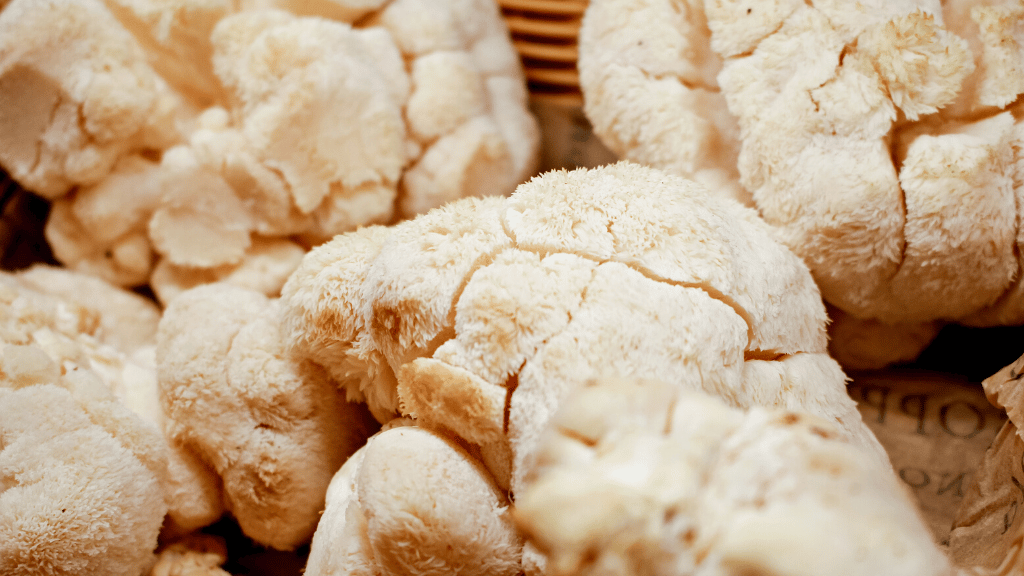


.png)
